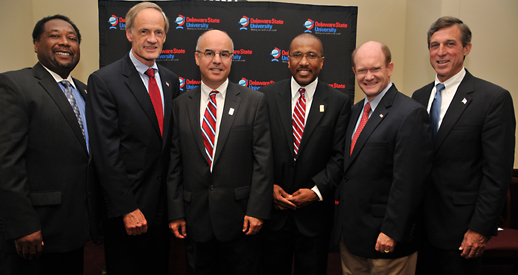
DSU CREOSA Awarded NSF Optics Research Grant
|
|
-
Spectroscopy and imaging of biomacromolecules in crowded and complex media.
-
Spin polarization in nanodiamond for nanoscale sensing and imaging.
-
Interactive data mining in experimental optics.
“I am proud of DSU for receiving this funding, which will help to prepare a diverse student population to meet the global, scientific and technological challenges of tomorrow,” said U.S. Senator Tom Carper, who along with Sen. Coons and Congressman Carney, worked with the DSU on its application to the NSF. “DSU’s Optics program is vitally important because it is helping transform the university into a premier research institution.”
|
|
 A group of optics faculty and students join Dr. Noureddine Melikechi for a celebratory photograph. |


 Dr. Noureddine Melikechi, founding director of DSU's Optics Program, said this grant will help the University produce the next generation of optical scientist, many of whom will come from underrepresented minority groups.
Dr. Noureddine Melikechi, founding director of DSU's Optics Program, said this grant will help the University produce the next generation of optical scientist, many of whom will come from underrepresented minority groups. Sen. Tom Carper chats with Dr. Renu Tripathi, assistant professor of optics.
Sen. Tom Carper chats with Dr. Renu Tripathi, assistant professor of optics.